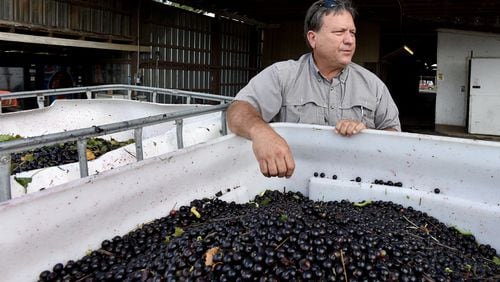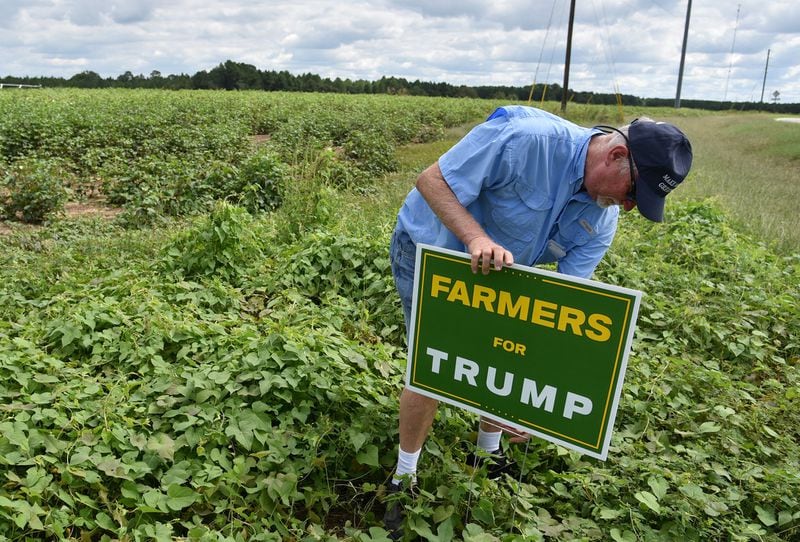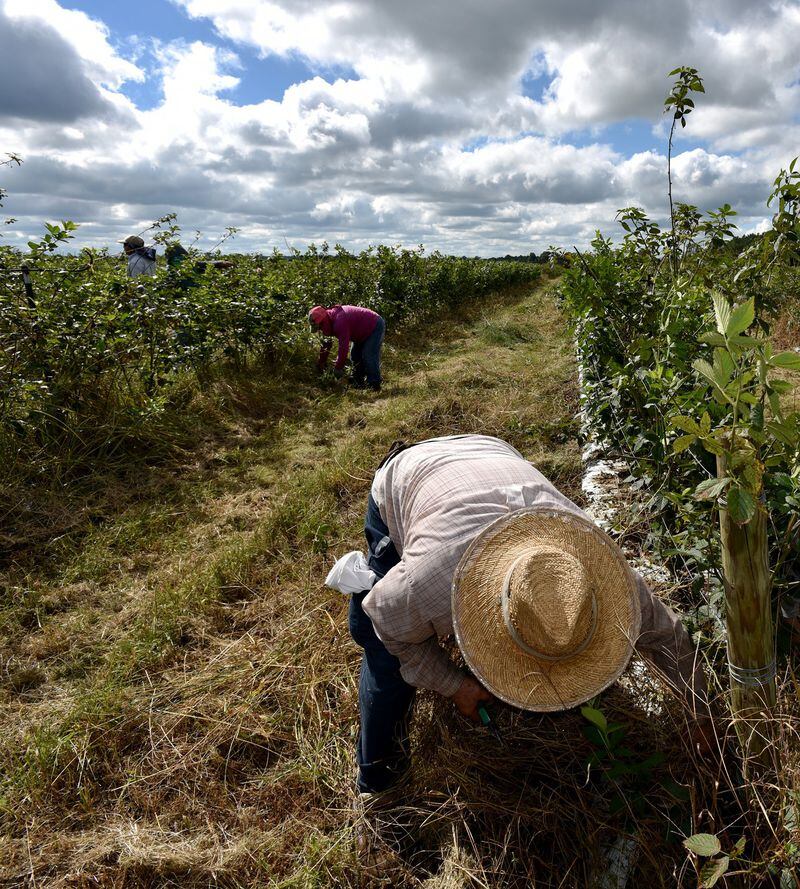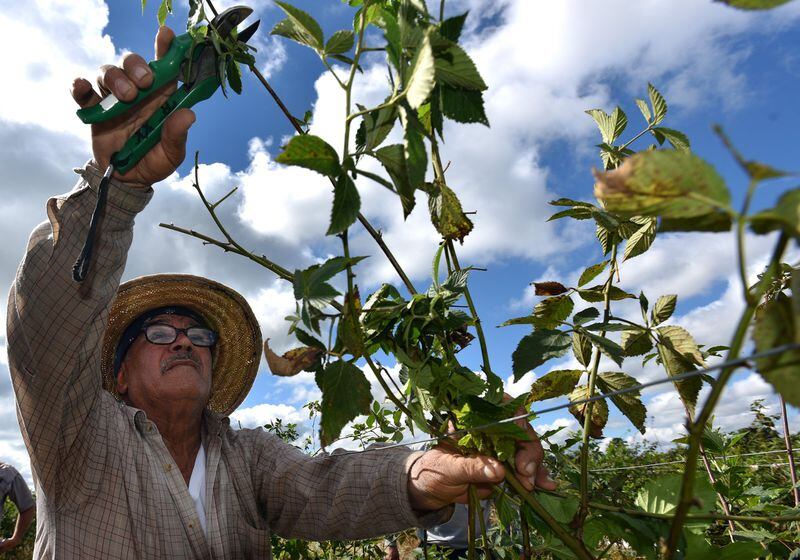Where they stand on immigration
Hillary Clinton
• Pledges to push for “comprehensive immigration form” with a pathway to citizenship for immigrants living illegally in the U.S. within her first 100 days in office.
• Supports President Barack Obama’s executive actions on immigration, which would temporarily shield millions of immigrants without papers from deportation.
• Wants to end the detention of families facing deportation and close private immigration detention centers.
Learn more: https://www.hillaryclinton.com/issues/immigration-reform/
Donald Trump
• Dismisses Clinton’s immigration overhaul plan as “amnesty” and pledges to ramp up enforcement against immigrants living illegally in the U.S., especially those with criminal records. Wants to triple the number of U.S. Immigration and Customs Enforcement agents and make Mexico pay for a new wall on the southwest border.
• Opposes Obama’s executive actions on immigration.
• Proposes that anyone caught illegally crossing U.S. borders will be detained until they are deported.
Learn more: https://www.donaldjtrump.com/policies/immigration
Sweet and cold, bunches of purple muscadine grapes the size of Ping-Pong balls are nestled inside a refrigerated warehouse on Gary Paulk’s sprawling farm here. The grapes — picked by seasonal laborers from Mexico and Central America — are destined for grocery stores across the Atlanta area.
An amiable farmer with an easy laugh, Paulk still remembers the bad days when his grapes and blackberries rotted in the fields five years ago. That’s when Georgia followed Arizona’s lead and enacted its own stringent anti-illegal immigration law, scaring away one-fifth of his Hispanic workers. Paulk said his family recorded roughly $200,000 in crop losses that year.
The workers, Paulk said, were worried whether the law would give police an excuse to harass them and even seek their deportation. In all, the state’s $74.3 billion agricultural industry — Georgia’s largest industry — said it sustained crop losses of $74.9 million because of labor shortages.
A Southern Baptist church deacon, Paulk typically votes Republican in presidential races, so Donald Trump should be able to count on his support. But the fifth-generation farmer is disturbed by the scathing things the GOP nominee has been saying about immigrants living in the U.S. without authorization. Paulk, who counts many immigrants as friends, fears Georgia’s farming industry would take another punch to the gut, if Trump is elected.
His anxiety underscores how conservative voters vary widely in their views of immigration. Georgia farmers exemplify that complexity.
On the stump, Trump’s call for an immigration crackdown - especially his signature pledge to build a wall along the border with Mexico - routinely wins wild applause from supporters. But some Georgia farmers say they depend heavily on Hispanic laborers because Americans won’t do physically taxing farm work, much of which takes place seasonally amid swarming gnats and blazing heat.
“If that is [Trump’s] rhetoric, and that is the way he feels, this single issue would keep me voting against him,” said Paulk, who operates a 1,000-acre farm in this tiny rural community about 200 miles southeast of Atlanta. “When I look at the reality of my life and livelihood, I don’t see the Republican vote being the best thing.”
Other Georgia farmers are backing Trump precisely because of his tough stance on illegal immigration. Among them is Paulk’s cousin, L.H. Dill, the chairman of the Irwin County Republican Party. Dill, who lives off a dirt road about eight miles from Paulk, said he hasn’t heard much from the Trump campaign about what he would do for farmers if he is elected. But citing the Sept. 17 bombing that injured more than 20 people in New York City, Dill said Trump’s ideas about securing the nation’s southwest border could bolster the nation’s defenses against terrorists.
Dill, who doesn’t rely on immigrant workers to help harvest his peanut and cotton crops, said the demand for Trump campaign signs is so high in his community that he keeps running out of supplies. Several yellow, green and white “Farmers for Trump” signs dot his property.
“A lot of people are coming across the border and we don’t even know who they are, and we need to stop that or we all… could be in very deep trouble,” said Dill, who served this year as a Georgia delegate to the Republican National Convention in Cleveland, where he got his prized blue “Make America Great Again” Trump campaign baseball cap. “We have got to protect our country. That’s what people see in Trump.”
Trump’s provocative comments about immigrants without legal status – he has accused Mexico of sending “drug dealers” and “rapists” to the U.S. – are particularly alarming for Paulk. But the farmer is also worried about Trump’s specific proposals for cracking down on illegal immigration.
Here’s why: Agricultural leaders say most of the nation’s hired farm laborers are in the country illegally. Paulk said he checks his laborers’ documents to ensure they are authorized to work in the U.S. But they may have relatives, he said, who don’t have legal status and who travel back and forth across the U.S.-Mexican border. Split up such families with walls and through deportations, Paulk said, and farmers could face substantial labor shortages.
“Families want to stay together at any cost,” he said.
Trump is proposing ending automatic birthright citizenship for the U.S.-born children of those living here illegally. He also wants to scrap an Obama administration program called Deferred Action for Childhood Arrivals — or DACA — which grants temporary deportation deferrals to immigrants who were illegally brought here as children. He says he wants to triple the number of U.S. Immigration and Customs Enforcement agents and he has variously proposed deporting some or all of the estimated 11 million immigrants living illegally in the U.S. Further, he is campaigning on building a wall on the southwest border at Mexico’s expense.
More than 100 miles northwest of Paulk’s farm, state Rep. Debbie Buckner and her family operate a grist mill and timber farm outside of Columbus. A Democrat and the vice chairman of the Legislature’s bipartisan rural caucus, Buckner said she is planning to vote for Clinton. She cited Clinton’s support for a government healthcare program that benefits children in rural areas and her efforts as a U.S. senator to promote New York’s agricultural industry by connecting farmers with distributors, schools and restaurants.
Buckner also supports Clinton because the former U.S. secretary of state wants to create a pathway to citizenship for immigrants without legal status. Clinton also supports the Obama administration’s DACA program and wants to end the detention of families facing deportation and close private immigration detention centers. Like Clinton, Buckner rejects Trump’s comments about Mexican immigrants who are illegally crossing the southwest border.
“This inflammatory rhetoric is not at all helpful,” Buckner said. “I think we need to give people a fair chance to get legal with a fair process.”
And while Georgia is a conservative state, voters here have more confidence in Clinton on immigration, according to an Atlanta Journal-Constitution poll from August. Conducted by Abt SRBI, the poll gives Clinton a 9-point advantage over Trump, 51 percent to 42 percent, well above the roughly 4.29 percent margin-of-error. Five percent of the 767 respondents who were surveyed by phone between Aug. 1-4 selected neither candidate when asked who they had more confidence in on immigration.
Clinton has collected $1.6 million in campaign donations from the agribusiness sector nationwide, according to OpenSecrets.org. In contrast, Trump has received $732,620.
Meanwhile, several organizations that represent farmers in Georgia are staying on the sidelines in the election, including the Georgia Farm Bureau, which does not endorse political candidates. Bryan Tolar, president of the Georgia Agribusiness Council, said his group also does not take positions on candidates. But he criticized the Obama administration’s efforts to overhaul the immigration system, regulate employers and manage the federal government’s guest worker programs. Many Georgia farmers like Paulk say those guest worker programs are flawed.
“A Hillary Clinton White House would follow the lines of where we are with the Obama administration White House,” Tolar said. “This administration has proven that it cannot come up with a political solution for immigration reform. We need to go another direction.”
Paulk recently led visitors on a tour of his farm, where Mexican and Guatemalan immigrants who have settled in the area were pruning his blackberry bushes. Paulk also hires laborers from Mexico and Central America through the federal H-2A guest worker program. That process requires him to first demonstrate he can’t find U.S. workers willing and able to do the labor. He said he is also required to pay his guest workers at least $10.59 an hour, though he said many earn more.
As they pruned the blackberry bushes, the workers repeatedly bent over, squatted, snipped off branches and pulled out weeds. To keep the sun off their skin, they wore pants, long sleeves and hats. They laughed nervously when they were asked about the presidential race. David Tinajero, who immigrated to the area from Mexico with his family, said in halting English of Trump’s immigration proposals: “No good.” His wife, Josefina, a crew leader on Paulk’s farm, said of the New York real estate investor: “He has said very bad things about us.”
Moments later, Jesus Guerrero, a contractor who helps recruit foreign farmworkers for the Paulk family, stopped by for a visit. A naturalized U.S. citizen, Guerrero was illegally brought from Mexico to the U.S. when he was four years old. Guerrero said he recently offered a simple piece of advice to a farmer who was thinking of voting for Trump: Just go ahead and pull out your blackberry bushes now because there will be no one to harvest them after the election. Guerrero resents what Trump has said about his countrymen.
“I’m definitely not voting for him,” said Guerrero, who has close-cropped black hair and a southern accent. “He is stereotyping me. I take that personally.”
About the Author










